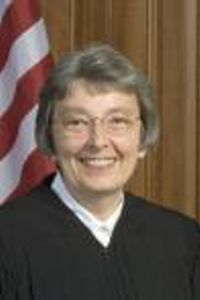Barbara Lenk
Barbara A. Lenk is a former justice on the Massachusetts Supreme Judicial Court. She served from 2011 to 2020.
Governor Deval Patrick (D) appointed her to the court on April 4, 2011, to replace retired Justice Judith Cowin. She retired on December 1, 2020, a day before she reached the mandatory retirement age of 70.[1][2][3] To learn more about this vacancy, click here.
Supreme Court nomination
On April 4, 2011, Governor Patrick appointed Lenk for a seat on the Massachusetts Supreme Judicial Court. She was confirmed by the Governor's Council on May 4, 2011.[2]
Lenk was the first openly gay justice on the court. Lenk said that her nomination "shows that my story is the American story, where anything is possible."[4]
Education
Lenk received a B.A. from Fordham University in 1972 and a Ph.D. in political philosophy from Yale University in 1978. She went on to receive her J.D. from Harvard Law School in 1979.[1]
Career
- 2011-2020: Justice, Massachusetts Supreme Judicial Court
- 1995-2011: Judge, Massachusetts Appeals Court
- 1993-1995: Judge, Massachusetts Superior Courts
- 1979-1993: Attorney, Brown, Rudnick, Freed & Gesmer[1]
Political outlook
In October 2012, political science professors Adam Bonica and Michael Woodruff of Stanford University attempted to determine the partisan ideology of state supreme court justices. They created a scoring system in which a score above 0 indicated a more conservative-leaning ideology, while scores below 0 were more liberal.
Lenk received a campaign finance score of -0.85, indicating a liberal ideological leaning. This was more liberal than the average score of -0.44 that justices received in Massachusetts.
The study was based on data from campaign contributions by the judges themselves, the partisan leaning of those who contributed to the judges' campaigns, or, in the absence of elections, the ideology of the appointing body (governor or legislature). This study was not a definitive label of a justice, but an academic summary of various relevant factors.[5]
Noteworthy cases
Lunn v. Commonwealth
On July 24, 2017, a unanimous Massachusetts Supreme Court ruled that Massachusetts law does not authorize state court officials to detain someone based solely on a request by federal immigration authorities.[6] Federal authorities make that request using a civil immigration detainer. As the federal government acknowledged, the court wrote, civil immigration detainers “are simply requests. They are not commands, and they impose no mandatory obligations on the State authorities to which they are directed.” Therefore, the court said, the question was whether state law authorized court officials to detain someone based solely on a civil detainer. Noting the specific circumstances under which state laws empower court officials to arrest or detain someone, the court ruled that “Massachusetts law provides no authority for Massachusetts court officers to arrest and hold an individual solely on the basis of a Federal civil immigration detainer, beyond the time that the individual would otherwise be entitled to be released from State custody.”[6]
See also
External links
Footnotes
- ↑ 1.0 1.1 1.2 Massachusetts Court System, "Associate Justice Barbara A. Lenk," accessed October 27, 2017
- ↑ 2.0 2.1 The Daily Free Press, "Gov. Patrick's fourth appointment to SJC confirmed," May 5, 2011
- ↑ WWLP.com, "Lenk delays retirement, keeps SJC at full strength," August 13, 2020
- ↑ Boston.com, "Another unprecedented SJC pick," April 5, 2011
- ↑ Stanford University, "State Supreme Court Ideology and 'New Style' Judicial Campaigns," October 31, 2012
- ↑ 6.0 6.1 Massachusetts Supreme Court, Lunn v. Commonwealth Slip opinion, filed July 24, 2017
Federal courts:
First Circuit Court of Appeals • U.S. District Court: District of Massachusetts • U.S. Bankruptcy Court: District of Massachusetts
State courts:
Massachusetts Supreme Judicial Court • Massachusetts Appeals Court • Massachusetts Superior Courts • Massachusetts District Courts • Massachusetts Housing Courts • Massachusetts Juvenile Courts • Massachusetts Land Courts • Massachusetts Probate and Family Courts • Boston Municipal Courts, Massachusetts
State resources:
Courts in Massachusetts • Massachusetts judicial elections • Judicial selection in Massachusetts
State of Massachusetts Boston (capital) | |
|---|---|
| Elections |
What's on my ballot? | Elections in 2026 | How to vote | How to run for office | Ballot measures |
| Government |
Who represents me? | U.S. President | U.S. Congress | Federal courts | State executives | State legislature | State and local courts | Counties | Cities | School districts | Public policy |








